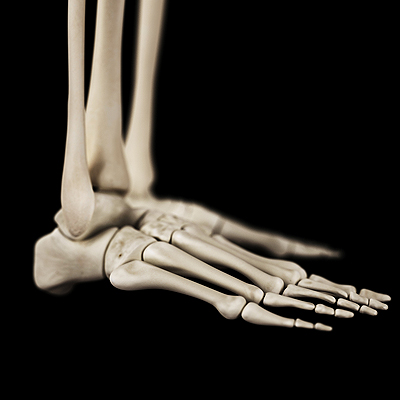 Stress fractures are small hairline fractures in the bone that most often occur from overuse. When the muscles in the body are fatigued, they can become unable to handle repeated shocks to the area. The shock instead transfers to the bone, which can crack. Most often, stress fractures occur in areas of the lower body like the feet and legs. The most common symptom of a stress fracture is pain in the area. If you are experiencing pain in the foot and ankle and think you may have a stress fracture, it is recommended to see a podiatrist. Rest is often the number one method in helping a stress fracture heal. Braces, pain medication, and ice may also be recommended, though not always. To prevent stress fractures, it is advised to start any new athletic activity slowly, gradually work your way up, and stop if you feel pain or have been pushing yourself with little rest.
Stress fractures are small hairline fractures in the bone that most often occur from overuse. When the muscles in the body are fatigued, they can become unable to handle repeated shocks to the area. The shock instead transfers to the bone, which can crack. Most often, stress fractures occur in areas of the lower body like the feet and legs. The most common symptom of a stress fracture is pain in the area. If you are experiencing pain in the foot and ankle and think you may have a stress fracture, it is recommended to see a podiatrist. Rest is often the number one method in helping a stress fracture heal. Braces, pain medication, and ice may also be recommended, though not always. To prevent stress fractures, it is advised to start any new athletic activity slowly, gradually work your way up, and stop if you feel pain or have been pushing yourself with little rest.
Activities where too much pressure is put on the feet can cause stress fractures. To learn more, contact one of our podiatrists from Livingston Foot Care Specialists. Our doctors can provide the care you need to keep your pain free and on your feet.
Dealing with Stress Fractures of the Foot and Ankle
Stress fractures occur in the foot and ankle when muscles in these areas weaken from too much or too little use. The feet and ankles then lose support when walking or running from the impact of the ground. Since there is no protection, the bones receive the full impact of each step. Stress on the feet can cause cracks to form in the bones, thus creating stress fractures.
What Are Stress Fractures?
Stress fractures occur frequently in individuals whose daily activities cause great impact on the feet and ankles. Stress factors are most common among:
- Runners
- People affected with Osteoporosis
- Tennis or basketball players
- Gymnasts
- High impact workouts
Symptoms
Pain from the fractures occur in the area of the fractures and can be constant or intermittent. It will often cause sharp or dull pain with swelling and tenderness. Engaging in any kind of activity which involves high impact will aggravate pain.
If you have any questions please feel free to contact our office located in North Bellmore, NY . We offer the newest diagnostic and treatment technologies for all your foot and ankle needs.